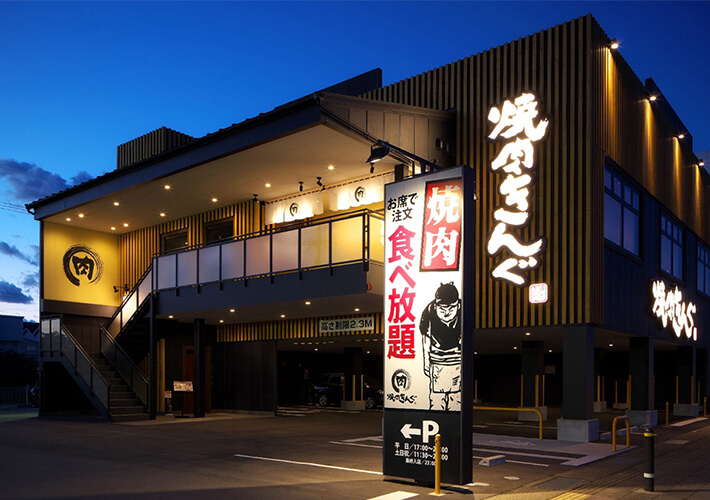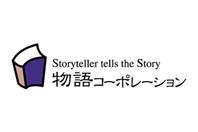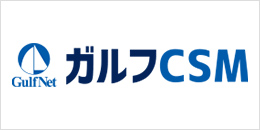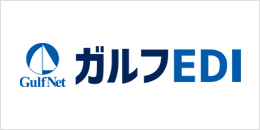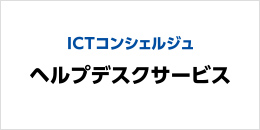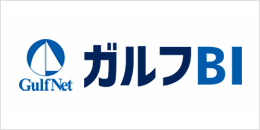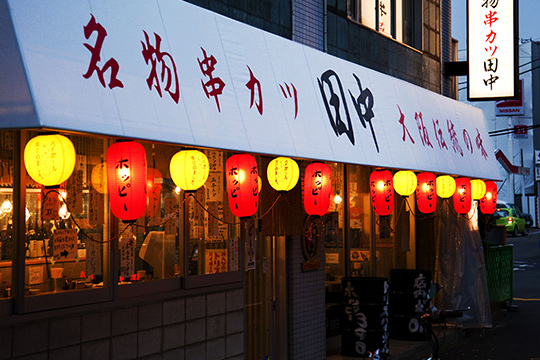Interview
Q: First, could you please give us a brief introduction to your company?
Mr. Imura: Monogatari Corporation is a company that excels in sales floor operations, human resource strength, and the development of business types and products. Currently, we operate four types of businesses: Yakiniku (Japanese BBQ), Ramen, Okonomiyaki (Japanese savory pancakes), and Japanese cuisine.
Mr. Teramoto: We manage three business formats for Yakiniku, two for Ramen, one for Okonomiyaki, and three for Japanese cuisine, making a total of nine formats across four business types. Currently, Yakiniku and Ramen account for 80% of our total sales.
Mr. Imura: Leveraging our strengths in human resources and development, we are a vibrant company continuously working to create new business formats.
Q: Regarding your strengths in human resources and development, why do you have such strong human resources?
Mr. Imura: Our corporate philosophy includes the phrase “Smile & Sexy.” In Japanese, this translates to “Smiling and Sexy.” However, within our company, the meaning of “Sexy” differs from its conventional definition—it signifies “having human charm.” Based on this philosophy, we focus on education and talent acquisition, which create a synergistic effect that enhances our human resource strength.
Q: How about your development capabilities?
Ms. Kawamoto: Our meeting structure is unique. Even in meetings attended by the president and executives, everyone is expected to speak. Additionally, each department has a product development section, where employees can freely express their ideas and develop their skills. This environment significantly contributes to our strong development capabilities. Depending on the individual, employees rotate to different positions every one to three years, allowing them to gain diverse experiences.
Mr. Teramoto: Our company openly identifies itself as a “developer group.” We have a system called “All-Employee Mail” that enables employees to ask questions such as, “What do you think about this type of business format?” This infrastructure allows employees to exchange opinions from anywhere in Japan. One major factor behind this culture is that our chairman is inherently an idea person.
Q: Could you tell us about your relationship with GulfNet?
Mr. Imura: At the time, we already had a core system in place. However, our chairman wanted to become “the No.1 company in the industry in terms of system implementation,” which led to the decision to introduce a new system. Initially, we tried to develop the system in-house, but we attempted to incorporate too many features, making it impossible to operate. As a result, the project stalled. At that point, we explored several companies specializing in restaurant industry systems and listened to their proposals. One of those companies was GulfNet.
Q: How did the idea of becoming No.1 in system implementation come about?
Mr. Teramoto: When defining the system requirements, we identified objectives such as “reducing store administrative tasks” and “analyzing data collected from POS systems.” Since we were going to address these challenges anyway, we thought, “Why not go beyond what other restaurant companies are capable of?” That was the starting point.
Q: Why did you ultimately choose GulfNet’s system?
Mr. Imura: We received demos from a total of five companies and obtained quotes from them. One key reason we chose GulfNet was its “comprehensive functionality.” Another deciding factor was that “it was specialized for store operations.” We were torn between GulfNet and one other company until the very end. The other company promoted its strengths as “offering robust store and headquarters functionalities.” However, since our philosophy aligned more with GulfNet’s “store-focused approach,” we decided to go with them.
Q: Why did Monogatari Corporation prioritize store operations?
Mr. Teramoto: The simplest reason is that “focusing on store operations yields a higher cost-effectiveness.” Monogatari has over 300 stores but only four headquarters offices. It is far more cost-effective to streamline store operations rather than headquarters functions. Additionally, Monogatari delegates significant responsibilities to each store. Therefore, focusing on store efficiency was crucial.
For example, Monogatari operates many converted (pre-owned) properties and has a diverse range of business formats, meaning that store layouts are not standardized. Even refrigerator models vary. This makes it impossible to establish uniform shelving layouts across all formats. GulfNet provided a solution that allowed store teams to configure layouts on their own. Because there were many areas where we could improve store efficiency, we ultimately chose GulfNet.
Q: Were there any other reasons for choosing GulfNet?
Mr. Uchida: This might be an after-the-fact justification, but we were aware that prioritizing store functionalities would increase the workload at headquarters. Despite this, GulfNet provided exceptional support. Furthermore, whenever we asked, “Can this be done?” they gave us clear “yes or no” answers. Other companies often gave vague responses, but GulfNet was always straightforward. Even after implementation, they remained available for consultation whenever needed.
Mr. Teramoto: GulfNet engineers not only understood the restaurant industry but also communicated with us in a way that was easy to understand. This was a major advantage. Development is important, but so is post-implementation support. Having clear and simple explanations gave us a strong sense of reassurance.
Q: Were there any issues during implementation?
Mr. Imura: I don’t recall any major problems. Nothing unexpected occurred.
Ms. Kawamoto: During implementation, GulfNet stationed their team with us for a month, helping with ingredient and recipe data entry as well as item registration. This was incredibly reassuring. Since our team had other duties and frequently encountered small questions, having GulfNet’s support on-site was invaluable. Of course, minor issues arose during implementation, but their immediate responses were a huge help.
Q: How do you feel about using GulfNet’s system now?
Mr. Uchida: One significant improvement is that “the system no longer crashes due to high traffic.” Additionally, with our previous system, store managers could manually set delivery dates for ordered items, even before actual deliveries were possible. This led to frequent inquiries such as, “When will my order arrive?” GulfNet’s system eliminated such order-related mistakes.
Ms. Kawamoto: We are beginning to see the benefits now. Previously, analyzing all-you-can-eat menu sales was difficult. It took a long time, and only a few skilled employees could do it. Soon, GulfNet’s system will enable us to register menu items as recipes and link them with POS data, making analysis almost automatic.
Mr. Teramoto: We haven’t seen numerical results yet, but many store managers say that administrative work has decreased as expected. Since we are allocating labor to other tasks, payroll costs might not be decreasing, but operational efficiency has certainly improved.
Q: Can you give specific examples of reduced store operations?
Mr. Teramoto: Tasks such as daily report creation, discount coupon management, and credit transaction registration have been eliminated. Also, redundant master data entry has been removed. Previously, we had to manually re-enter information from POS and Time and Attendance Management Systems. While total working hours haven’t necessarily decreased, unnecessary tasks have been eliminated, allowing employees to focus on other tasks, leading to significant cost savings.
Q: What has been the best part of working with GulfNet?
Mr. Uchida: GulfNet’s personnel are a great fit for our company. They don’t just respond to our requests as a vendor—they collaborate with us to solve problems. Their engineers even tell us directly, “That won’t be effective,” when necessary.
Ms. Kawamoto: I used to have a negative impression of system vendors, as they often said “No” too quickly. However, GulfNet is different. While they do say “No” at times, it’s usually because our requests wouldn’t be effective or meaningful.
End of Interview
Thank you very much.


